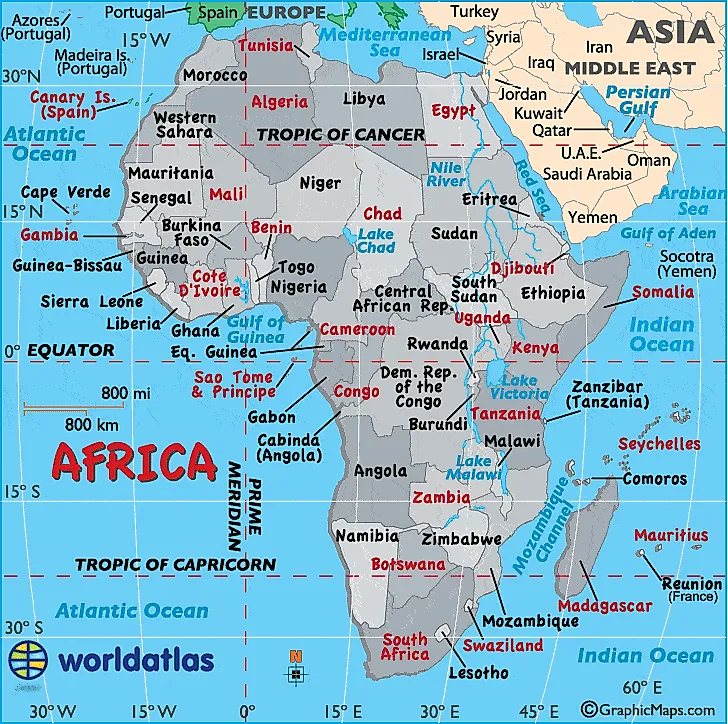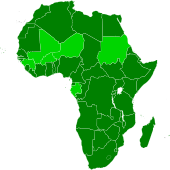- AFRICA
- Comprises 54 countries. It is the hottest continent and home of the world's largest desert, the Sahara, occupying the 25% of the total area of Africa.
Africa is the world's second largest continent by both land area and population. The equator runs through Africa in the middle of the continent. Around one third of Africa is located in the Southern Hemisphere. Africa makes up about 20% of the world’s total land area. The Indian Ocean, the Atlantic Ocean, the Mediterranean Sea and the Red Sea all surround Africa, to the east, west, and north respectively.
The climate of Africa consists of hot desert in the north and jungle and Savannahs in the middle and south. Africa hosts a large amount of biological diversity, and is home to more Mmegafauna (large animals) than anywhere else in the world. Examples of these animals include elephants, hippopotamuses, rhinoceroses, and giraffes.
Africa has the youngest population of all continents, with a median age of only 19.5 years. This has mainly been a result of high population growth over the past 40 years. Africa is extremely linguistically diverse, with an estimated more than two thousand languages spoken. The largest city in Africa is Lagos.
Africa's average population is the youngest among st all the continents;[5][6] the median age in 2012 was 19.7, when the worldwide median age was 30.4.[7] Algeria is Africa's largest country by area, and Nigeria is its largest by population. Africa, particularly central Eastern Africa, is widely accepted as the place of origin of humans and the Hominidae clade (great apes), as evidenced by the discovery of the earliest hominids and their ancestors as well as later ones that have been dated to around 7 million years ago, including Sahelanthropus tchadensis, Australopithecus africanus, A. afarensis, Homo erectus, H. habilis and H. ergaster—the earliest Homo sapiens (modern human), found in Ethiopia, date to circa 200,000 years ago.[8] Africa straddles the equator and encompasses numerous climate areas; it is the only continent to stretch from the northern temperate to southern temperate zones.Geology and geography
Africa is the largest of the three great southward projections from the largest landmass of the Earth. Separated from Europe by the Mediterranean Sea, it is joined to Asia at its northeast extremity by the Isthmus of Suez (transected by the Suez Canal), 163 km (101 mi) wide. (Geopolitically, Egypt's Sinai Peninsula east of the Suez Canal is often considered part of Africa, as well.)
The coastline is 26,000 km (16,000 mi) long, and the absence of deep indentations of the shore is illustrated by the fact that Europe, which covers only 10,400,000 km2 (4,000,000 sq mi) – about a third of the surface of Africa – has a coastline of 32,000 km (20,000 mi). From the most northerly point, Ras ben Sakka in Tunisia (37°21' N), to the most southerly point, Cape Agulhas in South Africa (34°51'15" S), is a distance of approximately 8,000 km (5,000 mi). Cape Verde, 17°33'22" W, the westernmost point, is a distance of approximately 7,400 km (4,600 mi) to Ras Hafun, 51°27'52" E, the most easterly projection that neighbours Cape Guardafui, the tip of the Horn of Africa.
Politics
There are clear signs of increased networking among African organizations and states. For example, in the civil war in the Democratic Republic of the Congo (former Zaire), rather than rich, non-African countries intervening, neighbouring African countries became involved (see also Second Congo War). Since the conflict began in 1998, the estimated death toll has reached 5 million.
The African Union
The African Union (AU) is a 55-member federation consisting of all of Africa's states. The union was formed, with Addis Ababa, Ethiopia, as its headquarters, on 26 June 2001. The union was officially established on 9 July 2002 as a successor to the Organisation of African Unity (OAU). In July 2004, the African Union's Pan-African Parliament (PAP) was relocated to Midrand, in South Africa, but the African Commission on Human and Peoples' Rights remained in Addis Ababa. There is a policy in effect to decentralize the African Federation's institutions so that they are shared by all the states.
The African Union, not to be confused with the AU Commission, is formed by the Constitutive Act of the African Union, which aims to transform the African Economic Community, a federated commonwealth, into a state under established international conventions. The African Union has a parliamentary government, known as the African Union Government, consisting of legislative, judicial and executive organs.
Economy
Although it has abundant natural resources, Africa remains the world's poorest and least-developed continent, the result of a variety of causes that may include corrupt governments that have often committed serious human rights violations, failed central planning, high levels of illiteracy, lack of access to foreign capital, and frequent tribal and military conflict (ranging from guerrilla warfare to genocide). Its total nominal GDP remains behind that of the United States, China, Japan, Germany, the United Kingdom, India and France. According to the United Nations' Human Development Report in 2003, the bottom 24 ranked nations (151st to 175th) were all African.
Poverty, illiteracy, malnutrition and inadequate water supply and sanitation, as well as poor health, affect a large proportion of the people who reside in the African continent. In August 2008, the World Bank announced revised global poverty estimates based on a new international poverty line of $1.25 per day (versus the previous measure of $1.00). 81% of the Sub-Saharan Africa population was living on less than $2.50 (PPP) per day in 2005, compared with 86% for India.


No comments:
Post a Comment